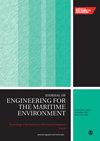Data-driven prediction of ship fuel oil consumption based on machine learning models considering meteorological factors
IF 1.5
4区 工程技术
Q3 ENGINEERING, MARINE
Proceedings of the Institution of Mechanical Engineers, Part M: Journal of Engineering for the Maritime Environment
Pub Date : 2023-11-22
DOI:10.1177/14750902231210047
引用次数: 0
Abstract
To improve the energy efficiency of ships and reduce greenhouse gas (GHG) emissions, the implementation of energy-efficient operation measures is particularly important. Driven by this, this study was dedicated to improving the accuracy of ship fuel oil consumption (FOC) prediction and laying the foundation for optimizing energy-efficient operations. Firstly, we combined voyage reports and meteorological data and constructed six datasets containing different features. These features comprise navigation-related features encompassing sailing speed, displacement and trim, as well as meteorological features encompassing wind, wave, sea current, sea water salinity and sea water temperature. Secondly, we conducted experiments with 14 popular ML models on the datasets and compared the prediction performance of different models by a new scoring system. Finally, we explored the advantages and disadvantages of each dataset based on the model performance scoring results and analyzed the effects of related meteorological factors on FOC during navigation. The key findings of the proposed work were that extra trees (ET), random forest (RF), XGBoost, and LightGBM had good fitting and generalization performance. Set5, the dataset containing the most complete meteorological data, achieved the best prediction results. In particular, it had an R2 (test) of 0.9317 on the ET model, which was 1.97% higher than the R2 (test) of the dataset using only voyage reports. The conclusions can assist shipping companies in constructing a ship FOC prediction framework and developing ship fuel-saving strategies.基于考虑气象因素的机器学习模型的船舶燃油消耗量数据驱动预测
为提高船舶能效,减少温室气体(GHG)排放,实施节能运营措施尤为重要。在此驱动下,本研究致力于提高船舶燃油消耗量(FOC)预测的准确性,为优化节能运营奠定基础。首先,我们结合航行报告和气象数据,构建了六个包含不同特征的数据集。这些特征包括航行速度、排水量和修整度等航行相关特征,以及风、波浪、海流、海水盐度和海水温度等气象特征。其次,我们在数据集上使用 14 个流行的 ML 模型进行了实验,并通过新的评分系统比较了不同模型的预测性能。最后,我们根据模型性能评分结果探讨了各数据集的优缺点,并分析了相关气象因素对航行过程中 FOC 的影响。这项工作的主要发现是,额外树(ET)、随机森林(RF)、XGBoost 和 LightGBM 具有良好的拟合和泛化性能。包含最完整气象数据的数据集 Set5 取得了最好的预测结果。其中,ET 模型的 R2(测试)为 0.9317,比仅使用航次报告的数据集的 R2(测试)高 1.97%。这些结论有助于航运公司构建船舶燃料成本预测框架和制定船舶节油战略。
本文章由计算机程序翻译,如有差异,请以英文原文为准。
求助全文
约1分钟内获得全文
求助全文
来源期刊

CiteScore
3.90
自引率
11.10%
发文量
77
审稿时长
>12 weeks
期刊介绍:
The Journal of Engineering for the Maritime Environment is concerned with the design, production and operation of engineering artefacts for the maritime environment. The journal straddles the traditional boundaries of naval architecture, marine engineering, offshore/ocean engineering, coastal engineering and port engineering.
 求助内容:
求助内容: 应助结果提醒方式:
应助结果提醒方式:


